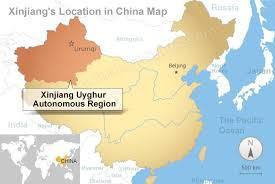 Xinjiang is China’s northwest province, home of the Muslim ethnic Uighurs (“wee-gurs”). Also home to a vast gulag of “re-education” camps — hundreds or possibly thousands, with more being built. And one local security chief said these camps are so full that their officials are begging police to stop bringing people.
Xinjiang is China’s northwest province, home of the Muslim ethnic Uighurs (“wee-gurs”). Also home to a vast gulag of “re-education” camps — hundreds or possibly thousands, with more being built. And one local security chief said these camps are so full that their officials are begging police to stop bringing people.
However, the numbers of policemen rival those of camp inmates. In at least one city (Hotan), every shop and restaurant must have a cop on duty, so thousands of their workers have been enrolled as part time police officers, fully equipped and made to undergo training.
The camp population has been estimated between half and one million; around a sixth to a third of young and middle aged Uighur men have been detained. The government does not acknowledge the camps’ existence, and little information about them has seeped out. One released prisoner said he was not allowed to eat until he’d thanked President Xi Jinping and the Communist Party. There have been (unsurprisingly) reports of torture.

Because of a past knife attack, knives and scissors are almost impossible to buy. In restaurants, kitchen knives are registered, and chained to walls to prevent use as weapons.
Police go in teams of half a dozen from house to house compiling dossiers of personal information, used to rate citizens for “trustworthiness.” Flunking gets you sent to a camp. What are they looking for? Basically any signs of Muslim religion — praying, eschewing alcohol, Ramadan fasting, long beards, and of course Koran possession. Going to mosque is a huge red flag, so mosques are empty. (China’s constitution purports to guarantee freedom of religion.)

Sound extreme? There’s more. The government also has a program called “becoming kin,” wherein a local family (usually Uighur) “adopts” an official (usually Han Chinese), who visits regularly, verifying dossier details, and even living with the family for short spells, “teaching” them. A 2018 report states that 1.1 million of these indoctrinator/snoops have been paired with 1.6 million families — roughly half the Uighur population.
And what is the government’s rationale for this ultra-totalitarian police state? To tamp down Uighur Muslim restiveness. It began when ethnic Han Chinese were encouraged to settle in Xinjiang to dilute the Uighur population dominance. With that came discrimination against Uighurs. This provoked Uighur protests, resistance, separatism, and eventually, as the government responded with escalating ferocity, some terrorism (that knife attack). China’s regime aims to crush all that. For now, the sheer extremism of its effort seems to be effective, leaving no option for Uighurs but to knuckle under.
Will Trump phone Xi Jinping to congratulate him on his “great security success” in Xinjiang?

And this is pure speculation on my part — I could be wrong — but is it just possible that China’s policy in Xinjiang exacerbates the very thing it’s supposedly combating — creating an entire population of deeply embittered enemies?
(This report is based on one in The Economist, June 2, 2018, and contains no exaggerations; in fact it’s mild in comparison.)
Advertisements